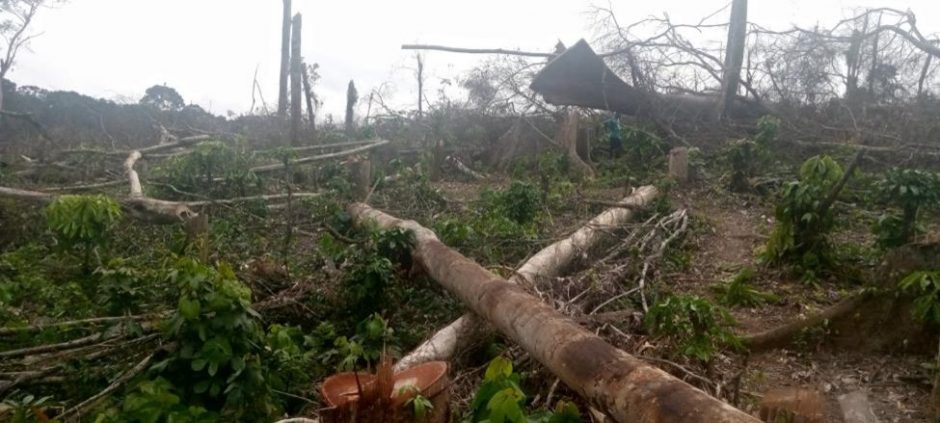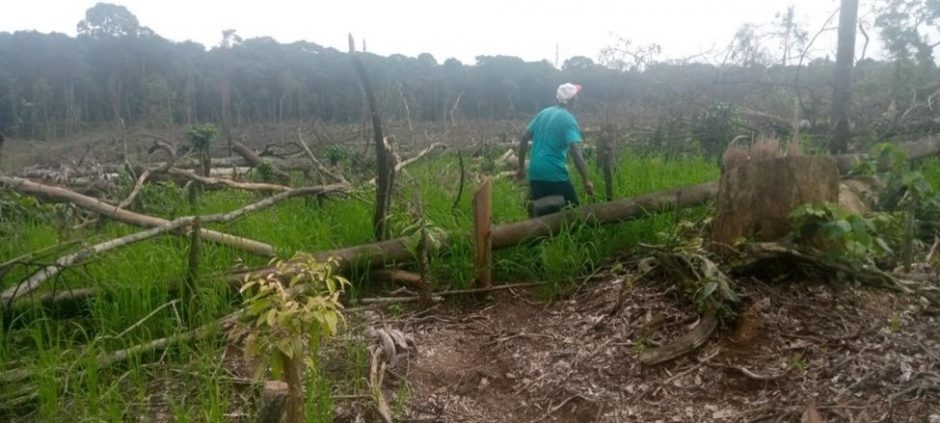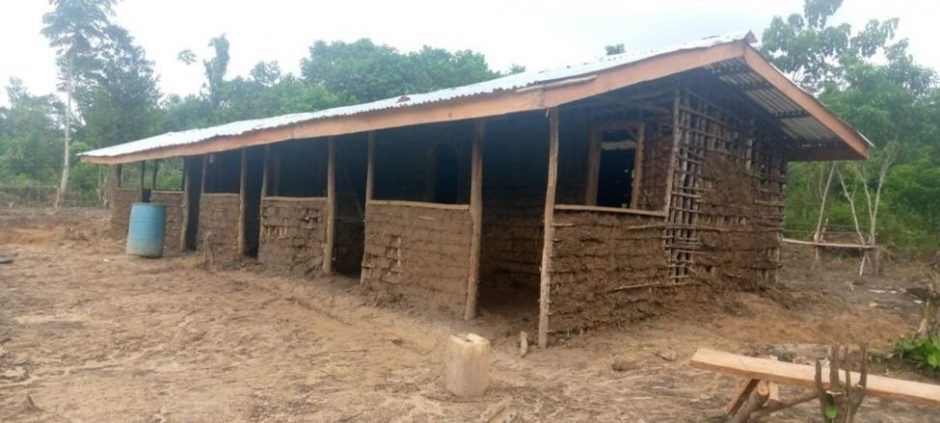
CEE TOWN, River Cess – For months, residents in this area of Gbarsaw Clan have watched with increasing alarm as hundreds of men with heavy machinery have cut down trees and hauled them away. In March, residents told The Bush Chicken that the land – more than 600 acres according to the local Community Land Development Management Committee chairman – is community customary land. The community had no idea who was funding the clearing.
Locals say no one had approached the committee, which the 2018 Land Rights Act charged with overseeing land ownership claims. Liberia’s historical two-tier land title system meant millions of Liberians did not legally own the land that generations of their forebears had lived on. The Act, passed by the George Weah administration despite criticisms that it was not well thought through, was designed to put more land in the control of communities.
“Almost close to 600 manpower has been brushing the area,” said the committee chairman Amos Vonziah in Cee Town, one of the 13 towns that make up Gbarsaw clan. “And they got roughly about five power saws felling trees.”
An investigation by The Bush Chicken has confirmed the clearing is being done by Bill Twehway, the managing director of the National Port Authority. But according to Vonziah, there has been no consultation with the community, as is required by the new land rights law, and none of the rules have been followed. It appears that Twehway simply identified a portion of land and began clearing it without seeking anyone’s input.
Bill Twehway did not respond to several requests for comment, but two of his brothers, Samuel Twehway and Nathaniel Twehway, confirmed that the NPA managing director funded the clearing of the land.
“Some part of last year, our brother Bill Twehway, he came and told us that he wants to make farm for every one of us,” Samuel said. He says Bill intended the farm to be for the residents of Cee Town, where he grew up. “He said whenever we make the farm, and it burns, then each of us [residents] going to put rice there. After harvesting, then he’s going to plant live trees, but he did not disclose which of the live trees he is going to plant.”
In July, The Bush Chicken toured the farm, about 24 kilometers away from Cee Town, guided by Nathaniel Twehway, another brother to Bill. He confirmed the purpose of the farm is to establish a cocoa plantation for Bill and Peter Twehway – not the community, as Samuel had claimed.

Nathaniel said the workers would be living at the plantation, where a camp house is being constructed.
“The place is far, so our brother [Bill] said he will construct a car road from the town to the farm,” Nathaniel said. “Right now, people are planting plantains on the farm. It is under the plantains the cocoas will be planted.”

During The Bush Chicken’s earlier March visit, Samuel claimed the entire Gbarsaw community would benefit from this plantation. He said members of each of the community would have been given a spot to plant their crops. But community leaders here say that they do not trust Bill because he is yet to follow any of the requirements governing customary land according to the Land Rights Act that his own government passed. They said that he must follow the rules even if he is building the farm for the community.
“That land is reserved for everybody; everybody got equal rights,” Vonziah said. “So when one person comes and takes huge quantity and plants live crops what will become of the next generation?”
Like Vonziah, Borbor Gbotoe, the town chief of Sayah Town, another in the clan, says Twehway has never met with the community to tell them how he acquired the land.
“The farm they’re talking about, I have heard [about] it,” Gbotoe said. “But when I leave from here and go there, when I talk it, they say it is for Bill. From there again, they say it is for the president.”
The issue of land rights is very sensitive in this area now. Gbarsaw Clan recently received a certificate from the Liberia Land Authority confirming that it will conduct a survey to decide on the boundaries of the land that will be given to the clan. Residents of the area are afraid that the confusion over Twehway’s plantation might undermine the process.
Chief Sammie Wheagar is the clan chief of Gbarsaw Clan. He says he heard a rumor that Twehway is funding the farm in question, but no one has written to his office officially.
The customary land rights officer at the Liberia Land Authority, Jerome Vanjahkollie, told The Bush Chicken that no portion of customary land can be transferred in the absence of what’s known as a “confirmatory survey” by the Liberia Land Authority.
“Land owned by the community that people stayed on [for] over 50 years and have controlled such land using their customary norms and practices, knowing their boundaries recognized by their neighbors, that land is considered customary land – and it is exclusively owned by the community members,” Vanjahkollie said. “You cannot conduct or transact any business in terms of transferring interest in any portion of that land until you conduct a confirmatory survey.”
The customary land rights officer said the law of adverse possession does not apply to customary land: “Anyone who’s wanting to go and seize customary land because they have some money, that could amount to wanting to use adverse possession to own that land.”
Bill Twehway did not respond to requests for comments despite numeral calls and texts from The Bush Chicken.
The community has not decided on what action it will take next, but Vanjahkollie said the Community Land Development Management Committee has the power to protect the land. He said in a situation like this, “it is either up to the CLDMC to file to the Liberia Land Authority, and if that doesn’t work, they can reach out to the court under the Criminal Conveyance Law.”
This dispute is the latest to come after the passage of the Land Rights Act. Authorities and CSOs have been unable to provide the precise number of disputes across the country, but they say they have been overwhelmed. In Bong, where a dispute has erupted between two communities, the superintendent stepped in and ordered a halt to all activities until it could be resolved.
This story was a collaboration with The Bush Chicken. Funding was provided by the American Jewish World Service. The funder had no say in the story’s content.
